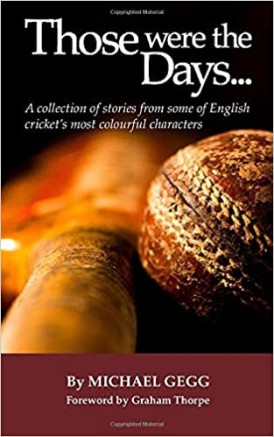Those were the Days …..
Martin Chandler |Published: 2020
Pages: 417
Author: Gegg, Michael
Publisher: Gegg, Michael
Rating: 4 stars

There are two reasons why anyone who reads this review should buy* this book. The first, and most important, is that every penny it makes in profit will go to the Ruth Strauss Foundation, a particularly worthwhile charity and one that, of course, has a cricketing connection. Putting a penny shy of £13 towards such a cause should not trouble most people unduly, so the second reason for the purchase is the bonus one, that being that Those were the Days… is a bloody good read.
But first things first, who is Michael Gegg? He describes himself as a true cricket nut, which is obviously a good start. He isn’t, as far as I am aware, employed in the media although I believe he has written a couple of previous books. He doesn’t say in his introduction what his day job is, but he can certainly write and whilst he may have been running a cricket website for a few years the quality of his prose demonstrates a real talent, rather than just a bit of experience picked up along the way.
Which brings me on to that website, www.addisarmycricket.co.uk. The Addis Army are a bit like the Barmy Army, in fact probably rather a lot like the Barmy Army, and as you will see the site is full of entertaining nuggets, not least of which are the regular interviews that Gegg conducts, a collection of 34 of which he has gathered together for Those were the Days…
Most of the interviews are with cricketers, although writer Scyld Berry, TMS presenter Charlie Dagnall and coach Richard Halsall each get a slot as well. The majority of those featured are male, but three ladies are included, Charlotte Edwards, Danni Wyatt and Linsey Smith. As you would expect there is a strong English bias, but Gegg has also caught up with former Aussie paceman Geoff Lawson, and also Scotland batsman Calum MacLeod. In a curious coincidence MacLeod, like Jake Perry in The Secret Game, references a fictional ODI in which Scotland defeat England – I can report that Gegg humours MacLeod on that one, as I suppose one must.
So who are the other 26 interviewees? All are retired but there is a broad range organised in date order based on First Class debut. On that basis first up is former Derbyshire and England wicket-keeper Bob Taylor, through to former Warwickshire player Neil Carter. There are some big names, Graham Thorpe (who provides a foreword) and Allan Lamb being the two most illustrious, and some solid county journeymen like Keith Parsons and Neil Burns.
Now interviewing people does sound like a bit of a cop out. You prepare a few questions in advance, get your guest started and with a bit of luck the flow of conversation gives you something interesting to transcribe. Or at least that’s what I thought, until I tried it. In truth people (interviewer included) repeat themselves, sometimes stumble, often ramble and sometimes just talk plain bollocks. Sorting the wheat from the chaff and then presenting what is left in a readable and interesting way is more difficult and time consuming than those who have not tried it may think.
So with 34 interviews surely a few of them are a bit ropy? Actually no – despite apologising in advance for the possibility that not everything would flow seamlessly there is nothing to criticise, and much to enjoy.
Ten of the participants have written autobiographies of varying quality; Taylor, Lamb, Thorpe, John Lever, Lawson, Paul Nixon, Ian Gould, Jack Russell and Angus Fraser. There are no questions asked of them that relate to anything they would not have been happy discussing in those books, and the questions asked follow a similar pattern. I stress however that that is not intended as a criticism. Part of the book’s appeal is the way in which the conversations are presented as what I suspect many were, a friendly chat over a pint.
I will single out two of Gegg’s interviews for particular comment, the first being one of the longer ones, that with former Surrey, Glamorgan and England batsman Alan Butcher. Now Butcher has written a fine book himself, The Good Murungu, back in 2016. So impressed was I with Butcher’s book that I have tried, more than once, to suggest to him that he should write a full autobiography. I have to report that he has never indicated any inclination to do so, but the contents of his conversation with Gegg serve only to confirm that, for once, I am right. Come on Alan, you have a cracking story to tell.
And finally, bringing up the rear and saving the best till last, is the interview with Scyld Berry. The veteran Daily Telegraph cricket correspondent’s comments are as incisive as always and his was, I would think, probably the easiest transcription of the lot. There is no mention in the conversation of Berry’s book, Cricket: The Game of Life, but it is a fine advert for a book that was widely acclaimed and which I have to admit is one of those that currently sits on my shelves unread – Gegg’s choice of questions, and the answers they prompted, have caused me to move that one to the top of the ‘pending pile’.
*The eagle eyed will have already realised that there is no link on the Addis Army website to enable purchase of the book. Michael Gegg and I both seek to blame the ubiquitous ‘IT people’ for this. Any moment now a new Addis Army website will go live and that will contain a link. In any event the book is available on Amazon.






Leave a comment